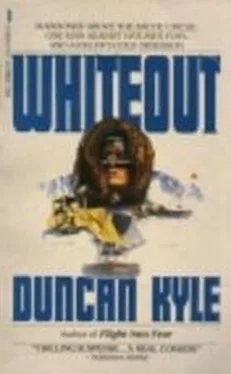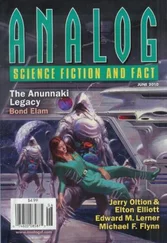Duncan Kyle - Whiteout!
Здесь есть возможность читать онлайн «Duncan Kyle - Whiteout!» весь текст электронной книги совершенно бесплатно (целиком полную версию без сокращений). В некоторых случаях можно слушать аудио, скачать через торрент в формате fb2 и присутствует краткое содержание. Год выпуска: 1976, ISBN: 1976, Жанр: Старинная литература, на английском языке. Описание произведения, (предисловие) а так же отзывы посетителей доступны на портале библиотеки ЛибКат.
- Название:Whiteout!
- Автор:
- Жанр:
- Год:1976
- ISBN:9780312868703
- Рейтинг книги:4 / 5. Голосов: 1
-
Избранное:Добавить в избранное
- Отзывы:
-
Ваша оценка:
- 80
- 1
- 2
- 3
- 4
- 5
Whiteout!: краткое содержание, описание и аннотация
Предлагаем к чтению аннотацию, описание, краткое содержание или предисловие (зависит от того, что написал сам автор книги «Whiteout!»). Если вы не нашли необходимую информацию о книге — напишите в комментариях, мы постараемся отыскать её.
Whiteout! — читать онлайн бесплатно полную книгу (весь текст) целиком
Ниже представлен текст книги, разбитый по страницам. Система сохранения места последней прочитанной страницы, позволяет с удобством читать онлайн бесплатно книгу «Whiteout!», без необходимости каждый раз заново искать на чём Вы остановились. Поставьте закладку, и сможете в любой момент перейти на страницу, на которой закончили чтение.
Интервал:
Закладка:
'We'll go forward to Forty-Eight. It's a longer walk, but the wind's at our backs.' Herschel turned. 'You guys wearing the whole outfit?'
Foster said, 'Yes, sir.'
'And you?'
'Yes,' I said.
'We'll check that out before we leave the 'cat. Answer me, item by item.1He ran through the list : snow boots, socks, long Johns, woollen trousers, windproof trousers, vests, shirts, woollen jackets, parkas, hats, hoods, silk-lined gloves, over-mittens. As he spoke each word, he checked his own clothing, too.
'Okay, let's get the hell out. This damn Polecat's turning into a deep freeze. When we get out, we stay close to the marker poles and we walk two together. I'll walk ahead with Scott, you and Foster side by side behind us, right?'
We nodded and he said : 'One more thing. Pull the drawstrings of the parka hood tight.' I pulled. 'No, tighter than that. So tight it comes nearly to a point. You only need a one-inch aperture there, so you can see through it. Main thing is it keeps the warmth of your respiration right in there with your face.'
I pulled the strings, gradually drawing the hood closer. The other three, more practised, had already finished and sat encased, with a khaki-green cone pointing forward where their faces should have been. Herschel's voice, when he spoke again, was muffled. 'No halts except for injury. I'll pull the stretcher. Out you go.'
The door opened, the wind howled in, and we clambered down into the freezing darkness and stood for a moment while Herschel and Scott pulled the steel sled-stretcher from the clips on the Polecat's side. When that was done, Scott switched off the lights and slammed the door. Now the other three were no more than dark shapes against the snow.
We set off, the dry snow loose underfoot, and walking was awkward. There was some compression, but the snow didn't bind and it was more like walking on sand. Through the inch aperture, I kept my eyes on the sled as Herschel dragged it along behind him, at once a sensible precaution and a grim warning. Every ten paces or so, Foster tapped me on the shoulder. The first time it happened, I turned towards him enquiringly, but he was continuing to walk, facing forward, his head not turned my way. I understood then. This was a way of maintaining contact with visibility sharply reduced, yet another of the endless list of careful precautions observed by the men who lived and worked high on the Greenland icecap. So it was ten paces, tap, ten paces, tap. And two miles to go, thirty inches to the pace, how many paces? How many taps? I did the mental arithmetic for the sake of something to do. Something over four thousand paces; something over four hundred taps. One, two, three, four . . , eight, nine, tap. One, two, three . . .
In front of us Herschel and Scott marched determinedly on. Nearly thirty years difference in age separated them, but Herschel was the stronger, moving easily, even with the stretcher trailing behind. Occasionally Scott had to hurry to regain his place beside him. Around us the wind snapped, whipping at sleeves and trousers, but also pushing us along. Two miles with the wind was going to be far easier than one against.
We'd gone some distance, more than three-quarters of a mile, I guessed, when I began to feel the cold. The exertion helped, no doubt, our bodies generating warmth that the high insulation properties of several layers of the special Arctic clothing kept in. It was my feet that felt it first. Ten minutes ago, perhaps a little longer, I'd been sitting warm in the speeding Polecat, thinking how snug I was. I now realized the word should have been smug. My feet had been warm. Good and warm. Very warm. Sweating] Which could mean damp in the boots! I began to feel slightly panicky. A night or two ago, I'd seen the ravages of frostbite gruesomely recreated in Scott of the Antarctic. I remembered, too, reading about Maurice Herzog, the French climber who dropped his gloves near the summit of Annapurna and watched them fall away down the mountain and knew in that moment, with total certainty, that he would lose all his fingers. Which he did .., seven, eight, nine, tap; what about the others? Their feet must have been sweating in the Polecat, too. Were they also feeling the cold? My heels no longer seemed to feel much as they came down, and I began to try to stamp harder, but it wasn't like walking on a hard surface; the snow absorbed the impact and still I felt nothing; it was merely increasing the strain on my thigh muscles, so I stopped.
Ahead of me, Scott stumbled and fell, but scrambled up quickly and ran a few steps to catch up with Herschel again. I told myself fiercely not to be stupid. Twenty-five to thirty minutes of hard walking in proper clothing, with the blood circulating briskly, was hardly likely to end in frostbite. I was being neurotic. All the same, the feeling seemed to be going out of my heels. And what was worse, I seemed to be having difficulty keeping up. Herschel and Scott were a bit further ahead, weren't they ? Tap, ten paces, tap. Was it just my heels, where the wind was striking? Or were my toes losing sensation, too? I tried to wiggle my toes. They seemed all right. But my legs were beginning to ache from the effort of walking on the sand-like surface. I wished it were sand, and that I was walking along a beach in warm sunshine! Herschel and Scott were drawing ahead! Tap, tap, on my shoulder. I turned my head to look at Foster and he waved his arm, signalling me to go faster.
We came to the wanigan quite suddenly. I doubt if I'd have seen it, but Scott and Herschel must have been able to judge the distance, or else the marker barrels gave them information, because they suddenly turned to the right, and as I followed, the flat orange rectangle of the safety wanigan loomed out of the dark. Drifted snow lay against it to a height of about eight feet, so that only the top couple of feet was visible. Herschel went quickly over to it and dug with his hands in the snow until he unearthed a shovel. Rank counted. He handed the shovel and the hard work to Scott, who obediently began to shift snow. It took only a couple of minutes, but enough for a chill feeling to begin, before most of the wanigan door showed, and we went in, slamming it behind us, and shutting out the noise. Inside, it was startlingly still and quiet. And Herschel said, 'My goddam feet must have been sweating in the Polecat ! Soon as we get some light around here, we'll have a nice, stinking, feet-rubbing fiesta.'
And we did. The air was full of the smell of feet as we sat on the floor in pairs, with the stove going warmly, rubbing. The same thing had happened to all four of us : there were eight pale heels, each of which began to tingle, then to burn as circulation crept back. There was no damage, nothing permanent, but like Smales's pork chop, it was another demonstration of power and vulnerability. It was also, I thought grimly, further proof of what Smales had said about minds working at only fifty per cent efficiency. Every man in the Polecat, all four of us, had known all about boot hazards, but the heater had been turned high and we'd revelled in it!
But now it was back to comfort. The safety wanigan was, to all intents and purposes, a large and well-fitted caravan and contained everything necessary to sustain the lives of four people for four weeks, including a wall-rack full of big bottles of liquefied gas. With the stove burning, I got a quick guided tour. As it happened, the wanigan we were in was a new type, recently oft the experimental list, and of a novel construction. Its walls were made of expanded polystyrene foam, sandwiched between layers of glass fibre. Foster was engaged on this very project, seeking better designs, but the principles of the thing were breathtaking. The glass fibre/polystyrene walls had tremendous thermal insulation properties, and a single kilowatt of heat was enough to maintain a temperature in the seventies, even if the hut were empty. With four men inside, heat was scarcely needed at all.
Читать дальшеИнтервал:
Закладка:
Похожие книги на «Whiteout!»
Представляем Вашему вниманию похожие книги на «Whiteout!» списком для выбора. Мы отобрали схожую по названию и смыслу литературу в надежде предоставить читателям больше вариантов отыскать новые, интересные, ещё непрочитанные произведения.
Обсуждение, отзывы о книге «Whiteout!» и просто собственные мнения читателей. Оставьте ваши комментарии, напишите, что Вы думаете о произведении, его смысле или главных героях. Укажите что конкретно понравилось, а что нет, и почему Вы так считаете.












